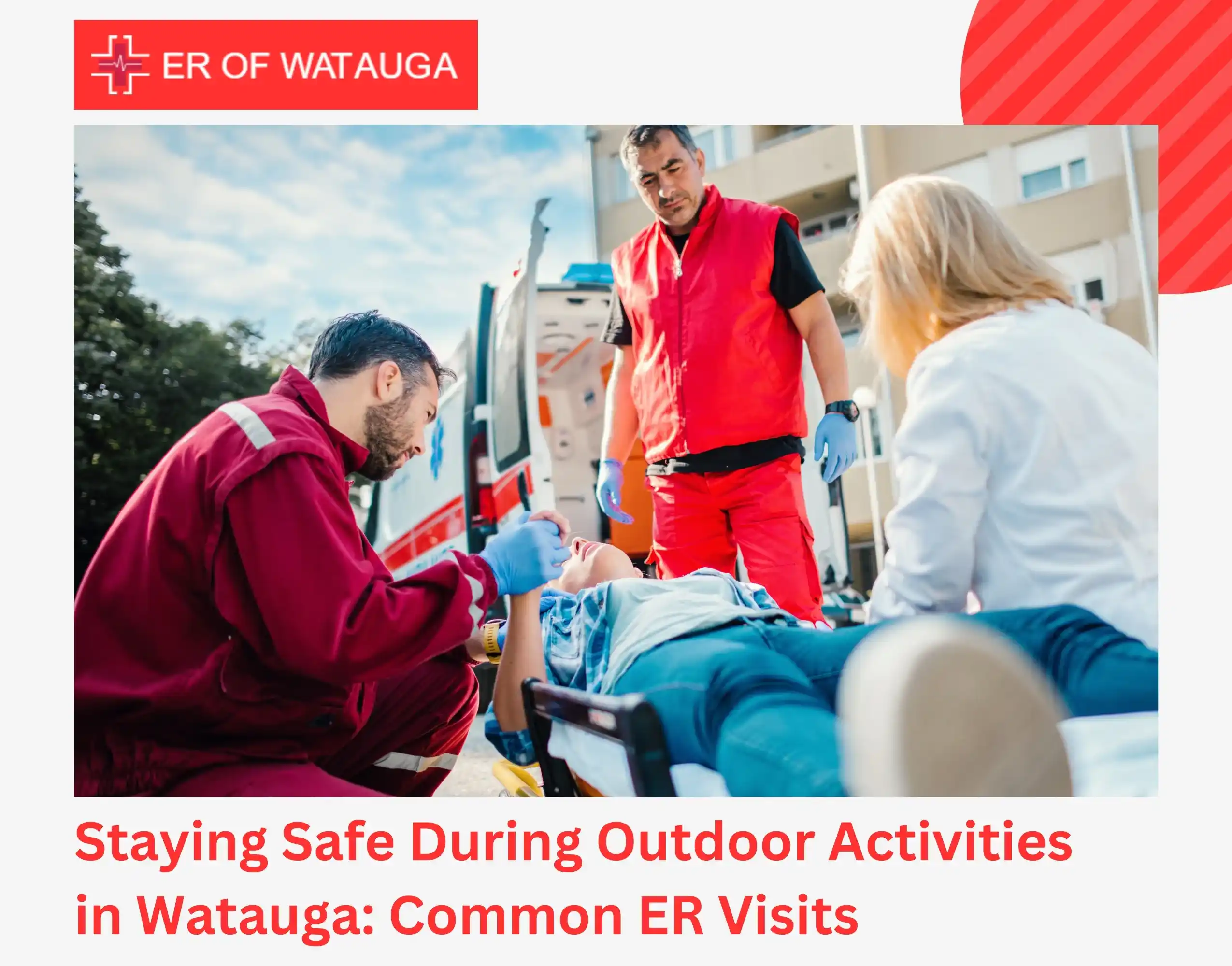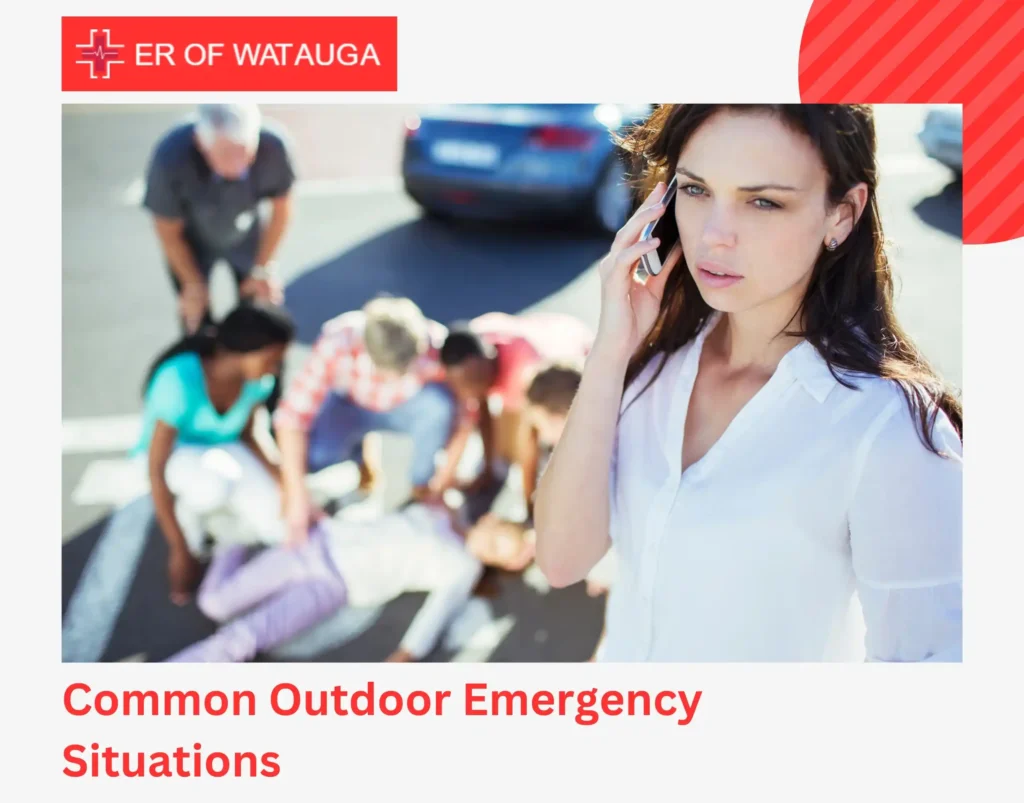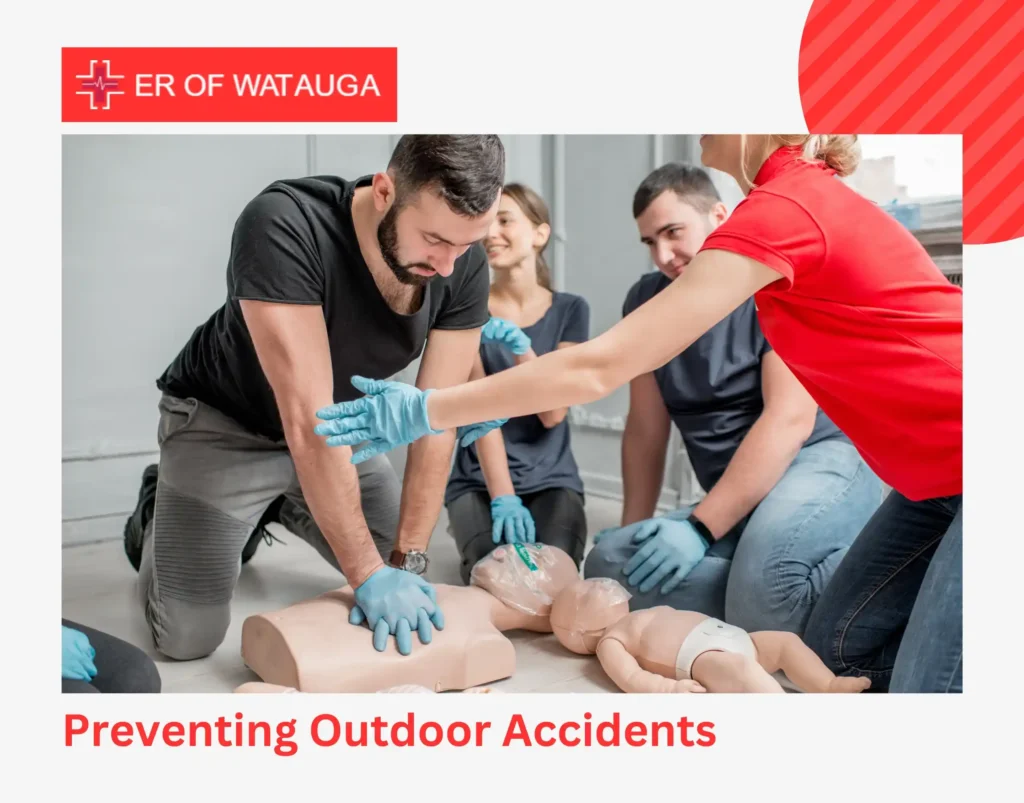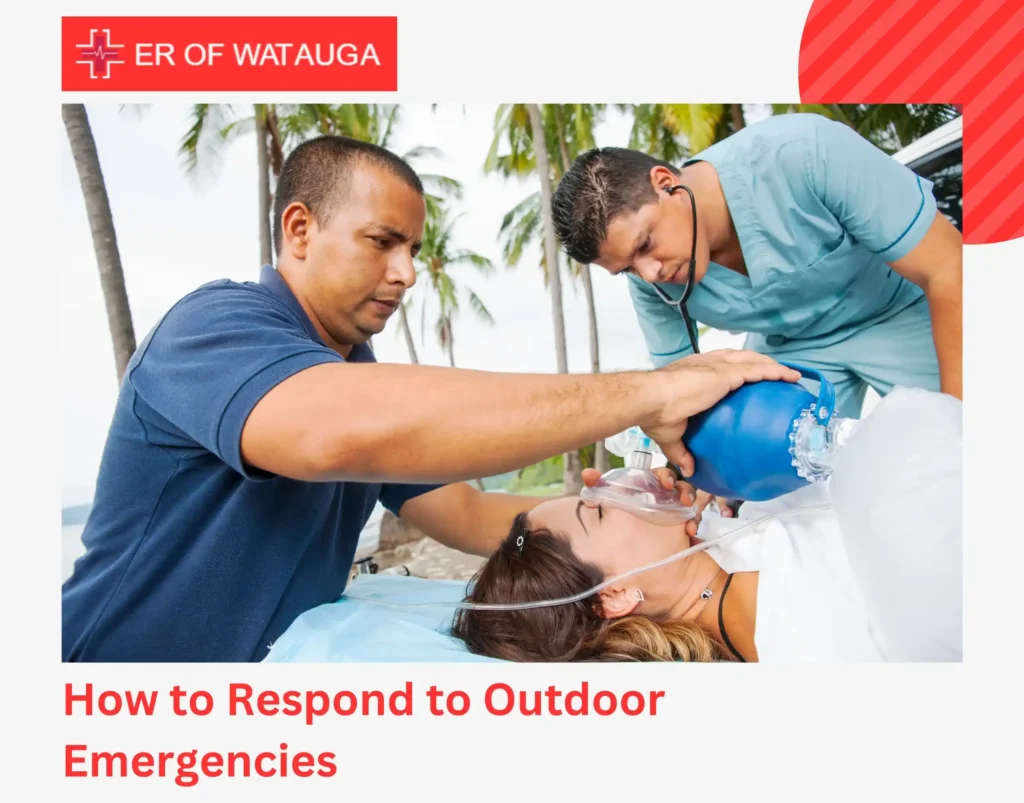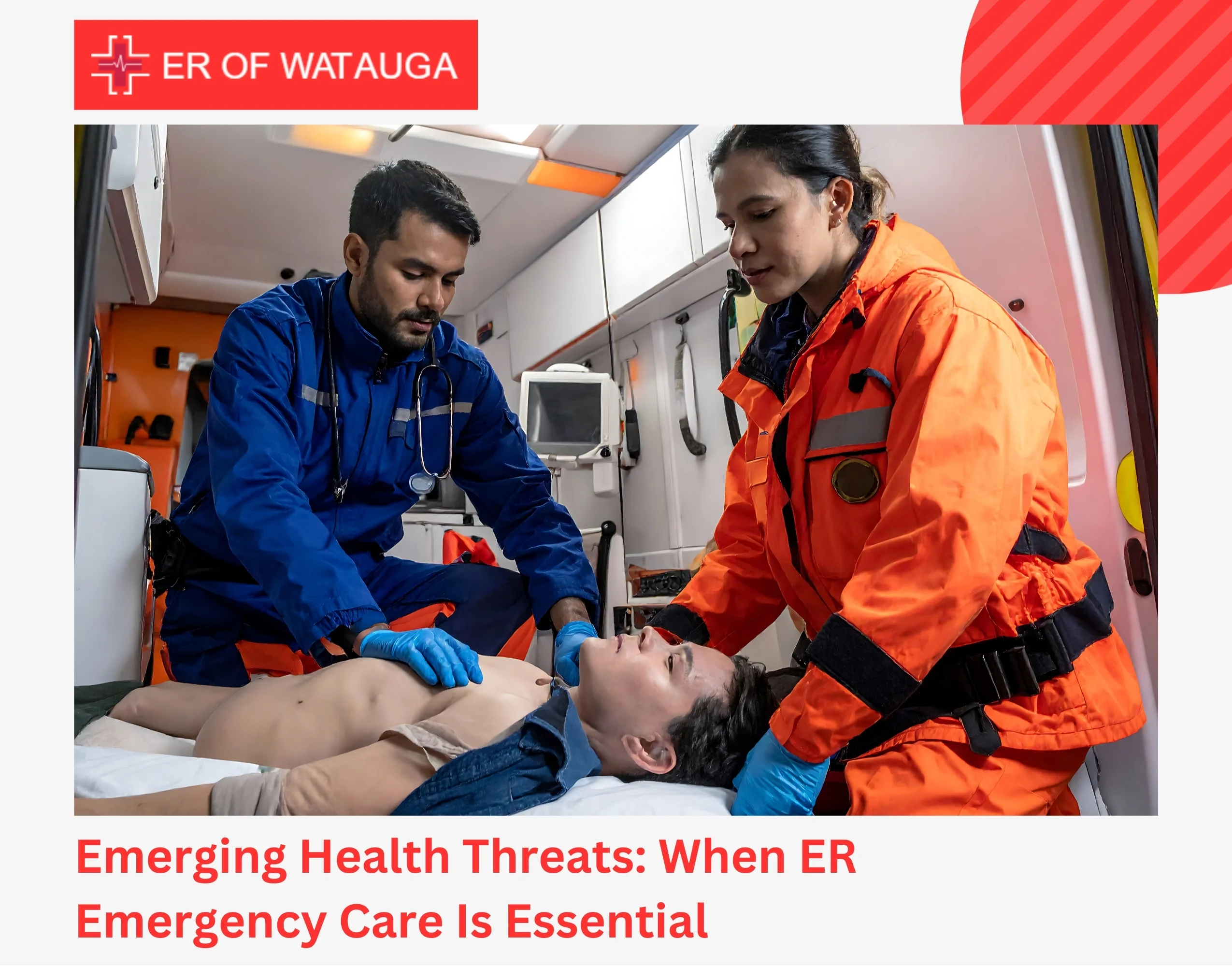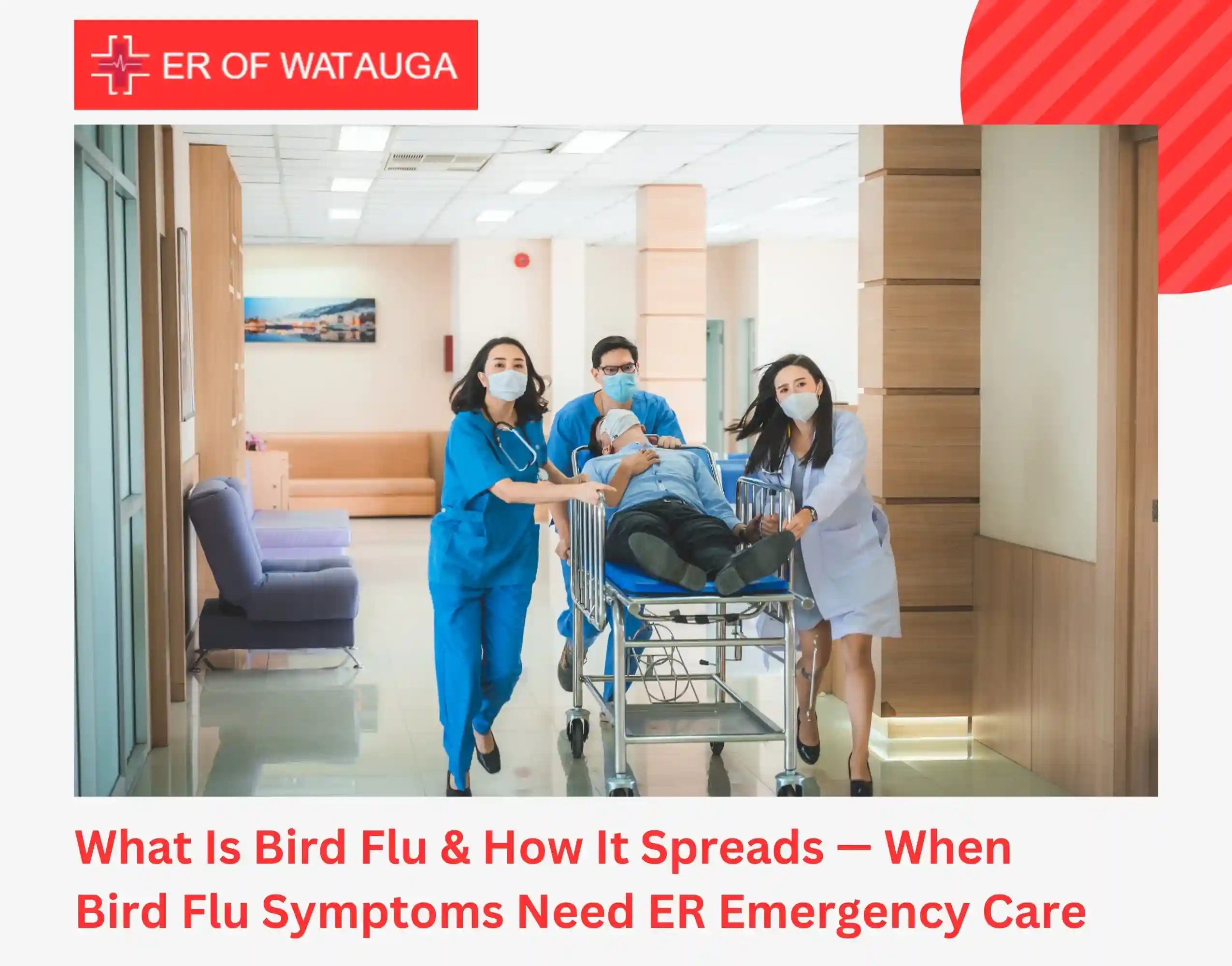Whether it’s a slip on a hiking trail or a sudden insect sting while gardening, outdoor activities can quickly turn from enjoyable to dangerous. Staying safe during outdoor activities and knowing when to seek immediate medical attention can make all the difference in preventing long-term complications or even saving a life.
With outdoor-related injuries contributing to countless ER visits each year, recognizing when to seek immediate care is crucial. This guide dives into common emergencies linked to outdoor fun and helps you prepare for the unexpected while staying safe in Watauga.
Common Outdoor Emergency Situations
1. Sports Related Injuries
Sports like soccer, basketball, and running are popular outdoor activities in Watauga. However, they can lead to:
- Sprains and Strains: Sudden movements or improper landing techniques often result in injuries to the ankles or knees.
- Fractures: High-impact activities can lead to broken bones, especially in the arms and legs.
- Concussions: Accidental collisions in contact sports heighten the risk of head injuries.
Prevention Tips for Sports-Related Injuries:
- Wear suitable protective equipment, including helmets and knee pads
- Make sure to warm up before engaging in activities to loosen your muscles and joints.
- Keep yourself hydrated to support your physical performance.
Read More: Common Sports Injuries and Their First-Aid Treatments
2. Heat-Related Illnesses
Watauga’s warm weather can lead to heat exhaustion or heat stroke, especially during summer outdoor activities.
Symptoms:
- Fatigue
- Dizziness
- Rapid pulse
- Nausea
Prevention Tips for Heat-Related Illnesses:
- Avoid outdoor activities during peak heat hours (10 AM–4 PM).
- Wear lightweight, breathable clothing.
- Stay hydrated with plenty of water and electrolyte-rich drinks.
- Take breaks in shaded or cool areas.
3. Cycling and Skating Accidents
Cycling and rollerblading are enjoyable activities, but they can lead to significant injuries such as:
- Road rash
- Broken bones
- Head trauma
Prevention Tips for Cycling & Skating Accidents:
- Always wear a helmet and other protective gear.
- Stick to designated bike paths and trails.
- Ensure your equipment is well-maintained
4. Water Related Accidents
With nearby lakes and swimming pools, water activities are a popular pastime. However, they come with certain risks, including:
- Drowning: Often resulting from insufficient swimming skills or ignoring safety precautions
- Cuts and Bruises: Caused by sharp objects or rocky areas.
Prevention Tips for Water-Related Accidents:
- Always supervise children.
- Ensure life vests are worn for boating or swimming in open water.
- Refrain from alcohol consumption while participating in water sports.
5. Hiking and Trail Injuries
Watauga’s hiking trails attract many outdoor enthusiasts but can lead to:
- Ankle Sprains: Caused by uneven terrain.
- Dehydration: Particularly on long trails without adequate water.
- Insect Bites and Stings: From ticks, mosquitoes, or bees.
Prevention Tips for Hiking & Trail Injuries:
- Wear sturdy hiking boots with ankle support.
- Carry sufficient water and snacks.
- Use insect repellent and check for ticks after hiking.
Preventing Outdoor Accidents
Plan Ahead
Thorough preparation reduces risks significantly:
- Monitor detailed weather reports and adjust your activities for any sudden changes, such as storms or extreme heat.
- Share your itinerary with a trusted contact, especially if you’ll be exploring isolated areas, and establish check-in times.
- Carry a well-equipped first-aid kit tailored to your activity, including bandages, antiseptic wipes, pain relievers, tweezers, and emergency items like a whistle and flashlight.
Stay Informed
Being aware of potential dangers in the area can improve safety:
- Get to know the local wildlife and learn how to prevent dangerous encounters, such as avoiding snakes or bears.
- Identify harmful plants like poison ivy, poison oak, or sumac.
- Before hiking or participating in water activities, check the trail conditions or water levels, as these can change quickly and heighten risks.
Teach Safety to Kids
Children often encounter increased risks when playing outside, making proactive education essential:
- Encourage them to stick to marked trails or designated play areas to avoid accidents or getting lost.
- Emphasize the importance of wearing helmets, knee pads, and other protective gear during activities like cycling or skating.
- Teach them the basics of water safety, such as not entering deep water without adult supervision and how to respond if they face strong currents.
How to Respond to Outdoor Emergencies
Immediate First Aid
Quick and effective first aid can stop minor injuries from getting worse:
- For sprains or strains, use the R.I.C.E. method: Rest the injured area, Ice it for 15–20 minutes at a time, apply a snug Compression bandage to help reduce swelling, and Elevate it above heart level to enhance blood flow.
- For cuts and scrapes, rinse the wound thoroughly with clean water to remove any debris, disinfect it with an antiseptic, and cover it with a sterile bandage to prevent infection.
- If you suspect a fracture, avoid moving the injured area. Use splints or nearby objects to stabilize the limb, keep the person comfortable, and seek medical attention right away to prevent further damage.
Recognizing Severe Symptoms
Being able to identify red flags could save a life:
- Loss of consciousness could indicate a head injury, heatstroke, or severe dehydration act quickly by checking for breathing and placing the person in a recovery position if needed.
- Difficulty breathing may result from allergic reactions, asthma, or chest trauma. Use an EpiPen if anaphylaxis is suspected, or provide rescue breaths if necessary.
- Severe pain or swelling in an injury may suggest a deeper issue like internal bleeding or a broken bone. Keep the area still and cold-packed while arranging for transport to an ER.
- Uncontrollable bleeding requires immediate action—apply firm, consistent pressure to the wound with a clean cloth, elevate the area if possible, and seek professional help without delay.
Key Takeaway
Some outdoor emergencies require immediate medical attention, such as heat exhaustion, fractures, severe allergic reactions, or head injuries. Recognizing these critical situations and acting swiftly can prevent complications and support faster recovery.
If symptoms escalate or you’re unsure of their severity, it’s always best to seek emergency care. Quick action can make all the difference in ensuring your safety during outdoor activities.
The ER Of Watauga offers comprehensive, 24/7 care for outdoor injuries and urgent medical conditions. With a team of experienced specialists and advanced medical technology, we ensure prompt, effective treatment to address your healthcare needs.
FAQs
How to be safe while participating in an outdoor activity?
When participating in outdoor activities, you can stay safe by wearing suitable gear and staying aware of your surroundings. Always inform someone about your plans and don’t venture out alone to ensure help is available if needed.
What are the risks associated with outdoor activities?
Outdoor activities come with various risks, such as sudden weather changes, wildlife encounters, injuries, getting lost, and water-related dangers. These risks highlight the importance of preparation and awareness.
How to stay safe in a community?
To stay safe in a community, it’s crucial to know your neighbors and be alert for any unusual activity. Securing your home with locks and participating in local safety programs can also enhance community safety.
